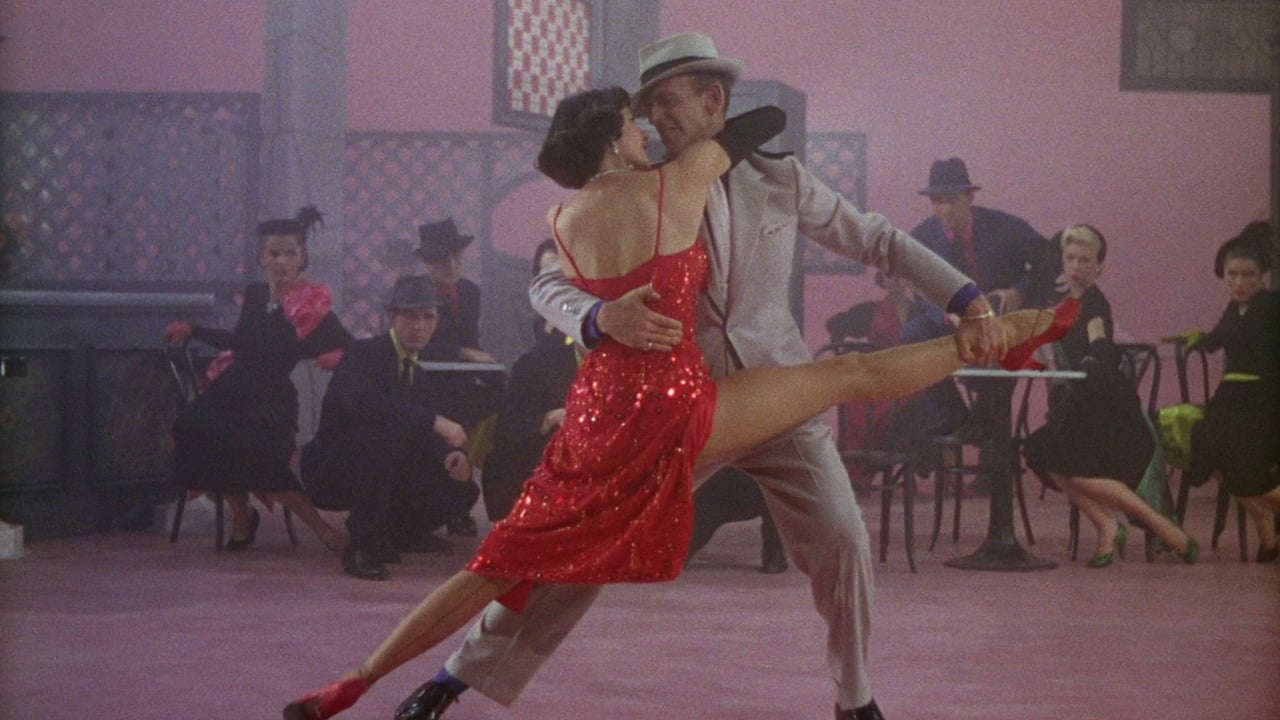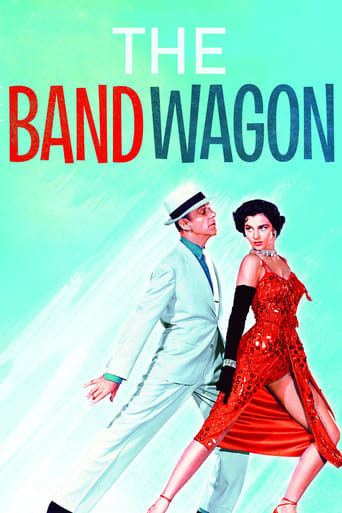

It's not great by any means, but it's a pretty good movie that didn't leave me filled with regret for investing time in it.
... View Moreit is the rare 'crazy' movie that actually has something to say.
... View Morean ambitious but ultimately ineffective debut endeavor.
... View MoreGreat movie. Not sure what people expected but I found it highly entertaining.
... View MoreForget about AN AMERICAN IN PARIS (1951) or GIGI (1958), this is "the" genuine chef d'oeuvre of a Minnelli musical, THE BAND WAGON is a glittering meta-pomp jauntily fights its corner for the middlebrow fluff over the highbrow pretension, not to mention it is where THAT'S ENTERTAINMENT! standard derives from. An over-the-hill screen star, is given an opportunity to headline a Broadway musical to resuscitate his ebbing career, if the protagonist were a woman, the film would be Billy Wilder's downbeat elegy SUNSET BLVD. (1950), but thanks to the showbiz's ingrained double-standard, for a nimble-footed Tony Hunter (a 54-year-old Astaire), everything is rosy and eventually he is able to have his cake and eat it too! (actualizing a consequential comeback and simultaneously winning over the heart of his much younger leading lady.) However, enveloped in his aw-shucks and avuncular bonhomie, he is fortuitously accorded with a laissez-passer.Creative license is put into comical use through the character of an omnipotent triple-threat Jeffrey Cordova (Buchanan, flip but nevertheless, an able hoofer), a very persuasive producer, a conceited director and a grandiloquent luvvie, who has been on a tear in Broadway and idiosyncratically decides to transpose the show's fluffy original material into a boundary breaker, viz. a musical reinterpretation of Faust. Everyone has to humor him on the strength of his clout, only a disastrous tryout can drench him out of his airy-fairy excess. Thankfully he ekes out enough alacrity to let the self-knowledge-savvy Tony resumes the rein henceforward, and the movie's money shots transpire in a string of pluperfect musical numbers, including the ingenious, knee-dancing ditty "Triplets" (Astaire, Buchanan and a sparkling, corn-fed Nanette Febray, who is particularly reminiscent of Astaire's quondam partner Ginger Rogers), and is topped off by the entrancing "GIRL HUNT" ballet pas-de-deux between Astaire and a voluptuous Cyd Charisse in her crimson sheath dress, against a modern noir-ish scenography.Endowed with a game and nimble cast (the monkey wrench in the works is a stooped Oscar Levant, often looks uncooperative and miffed on the sideline), THE BAND WAGON is a passé romance, lukewarm comedy but a sterling musical production, beaming with gems composed by Arthur Schwartz and Howard Dietz, choreographed by Michael Kidd, both ocularly and aurally, this first-time reviewer is stock-still bewitched with a waxing smile at the corner of his mouth.
... View MoreFred Astaire was 54 when he made 'The Band Wagon' with Cyd Charisse (who was 31), and he supposedly loved the role in 'The Band Wagon' because it allowed him to show what it was like to be in productions as an older dancer. The first half of the movie is engaging, as a musical is put together starting with a script from writers played by Oscar Levant and Nanette Fabray pitched to a bombastic producer played by Jack Buchanan. Astaire and Charisse's characters initially don't like one another, and the scene where they're all assembled at a gathering of Buchanan's to raise funds as he pitches his vision of the musical to the horror of the writers as well as touting stars who already 'want out' is fantastic. I loved the performance of 'That's Entertainment', which has since become a musical standard. Charisse and Astaire do have some great dance moments with one another, but performances overall are a little uneven. And, as the musical within the movie is reworked in the second half, it becomes a little hodgepodge, and it's hard to fathom how a hayride, a performance on triplets, and a film noir like number fit together (hint: they don't). There are some bright spots and the film is reasonably entertaining, but there is a lack of cohesion that separates it from the truly great musicals of the era.
... View MoreI can't think of movie I've seen that feels more stuffed than "The Band Wagon."I don't mean stuffed with plot or characters or themes. I mean literally physically stuffed. Virtually every frame is so crammed with people, props, and scenery that one almost expects characters from the movie to come tumbling out of the screen into his living room. That all of this busyness feels like carefully controlled chaos rather than just outright chaos is a testament to the skills of director Vincente Minelli, not one of my favorites usually, but who is at the top of his game here. "The Band Wagon" is basically a love letter to itself and films like it, colorful, fun musicals that exist for no other reason than to entertain, which, the movie would suggest, is one of the best reasons for existing in the first place. It chronicles the efforts of a bunch of show-biz buddies to transform a dour, Faustian-themed musical into a peppy comedy, and is actually a really good examination of what happens when otherwise good artists are matched with the wrong material, something that happens quite often with films and which gives "The Band Wagon" a reflexive, meta quality.The movie is at its best when the show within the show is at its worst. Oddly enough, by the time the gang had pulled everything together and we get a glimpse of the finished product, grand finale fashion, I found myself pretty bored with what they had assembled, which is a bunch of disjointed musical numbers that leave the viewer wondering what on earth this musical is about in the first place.Fred Astaire stars, while Cyd Charisse provides him his other pair of feet. Nanette Fabray, in a supporting role, steals the show with her energetic chutzpah. The film also boasts one of the most bizarrely disturbing musical numbers in film history, with Astaire, Fabray, and Jack Buchanan dressed up as babies singing about how they want to shoot each other dead so they can be left alone.Nominated for three Academy Awards in 1953: Best Story and Screenplay (Betty Comden and Adolph Green), Best Costume Design (Color), and Best Musical Scoring.Grade: A
... View MoreAbout 30 min too long, for me. Much of the between the musical numbers drama was painful for me to sit through. Oscar Levant and Jack Buchanan were generally a bore, not to mention Fred and Cyd in their May-December attraction-repulsion problem. Spritely Nanette Fabray is good in her Judy Garland-like role. While leggy Cyd was often a joy to watch in romantic, seductive or ballet numbers, she was no Judy Garland when it came to acting, comedy or singing(always dubbed). Some of her early dialogue makes her look like a school girl: not promising for an eventual romantic connection with Fred's mature character.I don't understand Cyd's rating of her dance with Fred to "Dancing in the Dark" as her favorite dance in her film career. It's a scenic romantic dance, no doubt, to a classic romantic song, staged as a spontaneous dance, making it seem more romantic. Fred does several partial lifts and supports. Unlike most male dancers, her never seemed to do full lifts, apparently being too weak(very skinny) to do so. Otherwise, I don't see this dance as being especially distinguished. Rather reminds me of Fred and Ginger or Rita. There are, of course, several additional memorable songs or dance routines. So, with fast forward DVD technology, this film is worth checking out, for those who enjoy watching dancing without slogging through the between verbiage.Along with a visible Fred, Cyd and others, the unseen musical stars are composer Arthur Schwartz, mostly with lyricist Howard Dietz, who collaborated, on and off, for decades, beginning in the late '20s, both being New Yorkers. Most of their best remembered songs are from several revues in the early-mid '30s, during the depths of The Depression. This film takes its title from one of these revues. However, the list of songs includes some from other shows during this period, as well as a couple of new compositions. By far, the most remembered of the latter is "That's Entertainment", which came to be the title and theme song for a series of compendia DVDs of the best musical moments in MGM films. In addition to being a lyricist, Dietz was important to MGM in spearheading many publicity campaigns and premieres, and came up with the roaring lion to start their films.Aware that most of the songs included were composed during The Depression, rather than during the relatively prosperous and optimistic '50s, gives us a better insight into the lyrics of the songs and even the plot of this film. The original "Band Wagon" was a musical revue, thus had no story to tell. It incidentally featured the dancing of Fred and his sister in their last stage performances before she retired for marriage and Fred went off to Hollywood. The screenplay concocted for this film involves an aging song and dance man(Fred) trying to decide whether to retire or try to find a new young partner(Cyd)to put some new spice into his act. While this had immediate personal relevance to Fred, it could also serve as an allegory to the state of mind of many people during The Depression. In Fred's first songs: "By Myself" and "With Shine on My Shoes", he's trying to cheer himself up, thumbing his nose at his recent professional flops, trying to convince himself that he can restart his career with the right new partner. Similarly, people during The Depression had hopes that prosperity would eventually return. While these scenes offer no remarkable dances, the inclusion of genuine African American shoeshine 'boy' Leroy Daniels, who attracted customers with song and comical dances, added more spice to Fred's adventures in the arcade.Yes, "Dancing in the Dark", at one level, provides a beautiful romantic tune and lyrics. The latter is saying that the combo of a new love and music can make us feel young again and have a joyful life as a team. But, it also has a realistic fatalistic component, in effect, reminding us that life is rather short and very uncertain(symbolized by darkness), hence we must be aggressive in finding and holding onto the most compatible mate we can find, to help make the most of our uncertain limited lives.The most innovative productions come toward the end. This includes the unique and very difficult(and painful) to do "The Triplets", in with Fred, Nanette and Buchanan are dressed as fraternal triplet babies, sing and do some 'dancing', with short artificial legs strapped to their knees: very awkward to deal with! The lyrics mostly emphasize the downside of being triplets...But the highlight of the film surely is the last big production: "The Girl Hunt": a very avant garde dance drama, lampooning the film noire genre. Fred plays Rod Riley: a NYC detective, who goes through a series of adventures, especially involving a team of gangster goons, a seductive blond and a seductive brunet(presumably both Cyd). The various scenes really have little connectivity, but all are interestingly staged, presumably by the talented choreographer Michael Kidd. In the end, Cyd appears to accompany Fred, after he has 'done in' the baddies. He remarks that she's clearly bad and dangerous(presumably a gangster's moll), but his kind of woman, nonetheless. ..Just before this production, Fred' character hints a marriage proposal to Cyd, but she says "I wish you wouldn't". But after the show, Cyd hints at a marriage proposal to Fred's character. The finale, in which all the principles join in a reprise of "That's Entertainment", provides the desired 'feel good' ending.
... View More